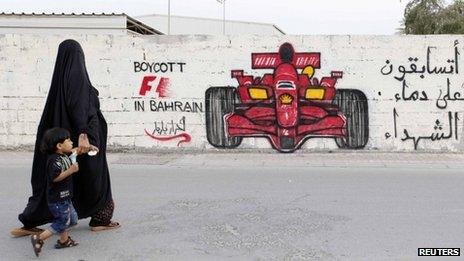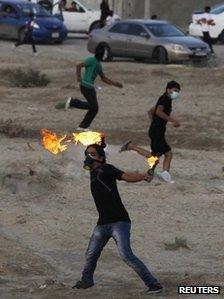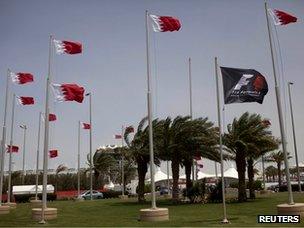Bahrain struggles to get Grand Prix back on track
- Published

Unrest on the island forced the cancellation of the 2011 Bahrain Grand Prix
Zayed al-Zayani gazes out over the Formula 1 racetrack in Sakhir, the scene of Sunday's Bahrain Grand Prix.
"This is a chance," he says, "to tell the whole world what Bahrain is really all about."
The history of the Bahrain International Circuit (BIC) - it was built in 2003 at a cost of $150m (£94m), and held its first Grand Prix in 2004 - was a smooth one for several years.
"I held the chequered flag for that first race," Mr Zayani, the BIC's chairman, recalls with a smile.
Cancellation
The Bahrain Grand Prix was the brainchild of Crown Prince Salman bin Hamad Al Khalifa.
Regarded by many as a moderniser and a reformer, he saw the potential of an international event that would introduce the country to a huge global audience.
Together with other reforms in the finance sector, the parliament, and to a lesser extent the media, Bahrain positioned itself as a progressive Gulf state, open to the West and its influences.
But the smooth ride hit the buffers last year when unrest in the island kingdom forced the postponement and then the cancellation of the Grand Prix.
Demonstrators buoyed by uprisings in Egypt and Tunisia had taken to the streets in February 2011 to demand greater democracy and an end to discrimination against the majority Shia Muslim population by the Sunni Muslim royal family.
The occupation of the iconic Pearl Roundabout in the capital, Manama, was a peaceful affair that soon turned bloody. It was forcibly cleared, leaving three dead and hundreds wounded.
The government found itself on the back foot as peaceful demonstrations continued and the roundabout was re-occupied.
Pearl Roundabout was only finally cleared when troops from Saudi Arabia and other Gulf Co-operation Council (GCC) states entered the kingdom in March 2011 in what was a moment of humiliation for the Khalifa family.
'Not the time'
In the months that followed more than 50 people died, including five security officers, hundreds of people were arrested, scores were tortured in jail and convicted in front of military tribunals, and more than 4,000 people were summarily sacked from their jobs.
The vast majority of those affected were Shia.

Thousands regularly turn out to protest in Shia villages around the capital
An international outcry led to King Hamad appointing a panel of human rights experts to investigate the events of February and March 2011.
Headed by the Egyptian, Cherif Bassiouni, the <link> <caption>Bahrain Independent Commission of Inquiry (BICI) report</caption> <url href="http://www.bici.org.bh/BICIreportEN.pdf" platform="highweb"/> </link> was a scathing indictment of his government. King Hamad accepted the findings and promised sweeping reforms.
His government says that among other things, the legal and law enforcement systems have been overhauled, employees who were unfairly dismissed have been reinstated, and a special prosecution unit set up to investigate abuse claims.
But critics say that little has changed. They point to the political prisoners still in jail, to ongoing arrests, to what they say are extra-judicial beatings of young protesters, and to the heavy use of tear gas.
Now, the critics say, is not the time to bring back Formula 1.
'Look forward'
Zainab al-Khawaja is an activist. Her father, Abdulhadi, a prominent human rights advocate, was one of those arrested last year, allegedly tortured and sentenced to life in prison.
"The government wants to use Formula 1 to say that everything is OK in Bahrain. It isn't," she says.
Like most Bahrainis, she is a fan of Grand Prix racing.
"We love having F1, we love having foreigners coming here. We welcome people, but not now, not when we are suffering so much."
Her father, who is in the third month of a hunger strike, has been moved to a military hospital amid concerns that he could die. His case has laid bare the wounds that a car race was supposed to be healing.
But Zayed al-Zayani says this race will make a difference.
"We have a choice - to embrace each other or to point fingers and if we are genuine about putting the nation back together than we should look forward, not back."
For some in this divided island his words represent sound advice.
Among them is the Justice and Islamic Affairs Minister, Sheikh Khaled bin Abdullah Al Khalifa. He reflects the view of the government, most Sunni Bahrainis and many in the large expat community.
"F1 is an opportunity for our economy [and will] show the people who are visiting us an open country and a centre for such a lovely sport. You will see me there."

Preparations for the Grand Prix are well under way at the Bahrain International Circuit
'Discomfort'
For others, though, Mr Zayani's call to move forward has a hollow ring.
Dr Nada Dhaif was sentenced to 15 years in jail. Her only crime, she says, was seeking to help injured protesters last year.
She says she was tortured, threatened with rape and forced into signing a confession while blindfolded.
She is one of nearly two dozen doctors currently out of jail, but with their convictions still hanging over them.
"Would you, as a foreigner, be comfortable watching the race while a neighbouring village is being tear-gassed?" she asks. "Would you feel OK while such human rights violations are taking place?"
And for Zainab al-Khawaja there is no turning back.
"The people of Bahrain don't want the country back the way it was. We want a better Bahrain. That is what we sacrificed for and that is what we deserve."